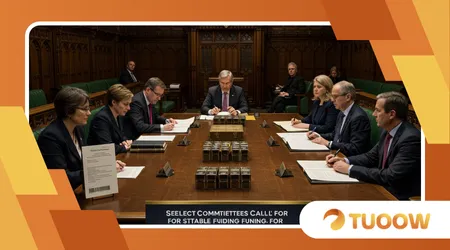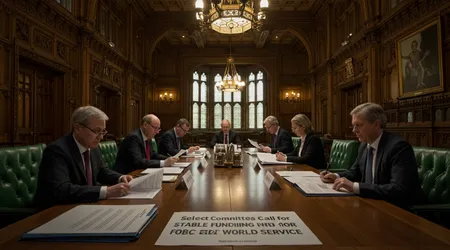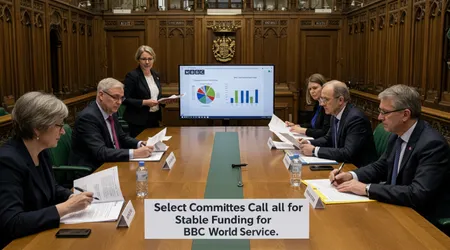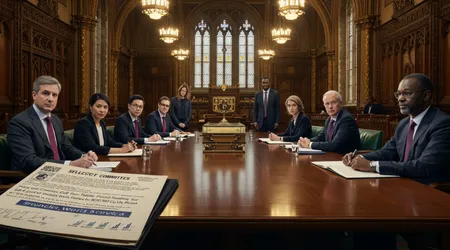Select Committees Call for Stable Funding for BBC World Service

The push for stable funding for BBC World Service has gained momentum as three Commons select committees Culture, Media and Sport; Foreign Affairs; and International Development unite in a rare call to action.
In 2025, with global disinformation on the rise and soft power more critical than ever, these committees argue that the World Service’s precarious financial model, heavily reliant on license fees and sporadic grants, threatens its ability to deliver impartial, world-class journalism.
This article explores why securing stable funding for BBC World Service is not just a budgetary necessity but a strategic imperative for the UK’s global influence.
Can the government afford to ignore this plea when the stakes are so high?
The BBC World Service, broadcasting in over 40 languages, reaches 320 million people weekly, countering propaganda and fostering trust in UK journalism.
Yet, its funding remains a patchwork of license fees and short-term Foreign Office grants, creating uncertainty.
The committees’ joint report, published in April 2025, demands a long-term funding model to ensure operational resilience.
This isn’t about luxury; it’s about safeguarding a global public good in an era of hybrid warfare and information manipulation.
Why does this matter now?
The world is grappling with authoritarian regimes amplifying disinformation, from Russia’s state media to China’s global propaganda networks.
The World Service’s role as a beacon of truth is irreplaceable, yet budget cuts and funding volatility hamper its reach.
The committees’ call reflects a broader anxiety: without stable funding for BBC World Service, the UK risks ceding ground in the global information war.
The Case for Stable Funding for BBC World Service
A Strategic Asset Under Threat
The BBC World Service isn’t just a broadcaster; it’s a cornerstone of UK soft power.
Its global audience trusts it for unbiased reporting, unlike state-controlled outlets.
However, its budget, partially tied to the license fee, faces scrutiny as Culture Secretary Lisa Nandy calls the fee “unenforceable” and explores alternatives.
Short-term grants from the Foreign Office, like the £27 million uplift for 2025, are welcome but insufficient for long-term planning.
This funding instability stifles innovation. For example, launching a satellite news channel in Myanmar post-earthquake required rapid resource allocation.
Without stable funding for BBC World Service, such agility becomes impossible.
The committees argue that a predictable budget would enable strategic investments in digital platforms, countering platforms like TikTok, where disinformation thrives.
++ DoorDash Makes $3.59 Billion Bid for UK’s Deliveroo
Moreover, the World Service’s reach in conflict zones like Ukraine or Myanmar relies on secure funding.
A 2024 Ofcom report noted that 78% of global audiences value its impartiality, a trust earned through decades of consistent service.
Yet, without stable funding for BBC World Service, this trust risks erosion, weakening the UK’s diplomatic influence.

The Cost of Inaction
Failing to secure stable funding for BBC World Service has tangible consequences. Budget uncertainty forces cuts to language services, reducing reach in critical regions like Sub-Saharan Africa.
For instance, in 2023, the World Service axed 382 jobs and several radio services due to funding pressures, limiting its Arabic and Persian outputs.
This isn’t just a loss of jobs; it’s a loss of influence where it’s needed most.
Consider the analogy of a lighthouse: the World Service guides global audiences through the fog of disinformation.
Also read: How to Save Money While Living in the UK
Without steady fuel stable funding for BBC World Service its light dims, leaving ships adrift in a sea of propaganda.
The committees warn that continued reliance on stopgap funding risks permanent damage to its global reputation.
The economic argument is equally compelling. The World Service generates £500 million annually in economic value through cultural exports and tourism, per a 2022 Deloitte study.
Yet, underfunding threatens this return on investment, as competitors like Al Jazeera and RT expand with state-backed budgets.
Challenges in Securing a New Funding Model
Navigating the License Fee Debate
The license fee, currently £169.50 annually, funds much of the BBC’s operations, including the World Service.
However, its future is uncertain. Nandy’s review of the BBC’s charter, set for late 2025, explores alternatives like subscriptions or advertising.
These models, while innovative, risk commercializing the World Service, undermining its public service ethos.
For example, a subscription model might exclude low-income global audiences, reducing reach in developing nations.
Read more: UK Inflation Falls to 2.6% in March, Easing Pressure on Bank of England’s Interest Rate Decisions
Advertising could compromise editorial independence, as seen with outlets like CNN, where sponsor pressures occasionally shape coverage.
The committees advocate for stable funding for BBC World Service through a hybrid model, blending public funds and international partnerships.
The challenge lies in political will. With the government prioritizing domestic issues like NHS funding, allocating resources to global broadcasting is a hard sell.
Yet, the committees argue that soft power is as vital as hard power, deserving a dedicated budget line.
Balancing Domestic and Global Priorities
The UK’s fiscal constraints complicate the push for stable funding for BBC World Service.
The 2025 budget prioritizes domestic sectors like education and healthcare, with no additional funding for public sector pay deals.
Allocating funds to the World Service risks public backlash, especially among license fee payers who question its relevance.
However, the committees counter that global influence bolsters domestic prosperity.
The World Service’s promotion of British values like democracy and free speech attracts foreign investment and tourism.
For instance, its coverage of British innovation, like AI in agriculture, showcases the UK as a leader.
A practical solution could involve ring-fencing World Service funds within the Foreign Office budget, ensuring stability without burdening domestic taxpayers.
This approach, endorsed by the committees, aligns with the £104 million baseline grant for 2025, which requires expansion.
Global Competition and the Funding Gap
The global media landscape is fiercely competitive.
State-backed broadcasters like China’s CGTN and Russia’s RT operate with multi-billion-dollar budgets, dwarfing the World Service’s £400 million annual allocation.
This funding gap limits technological upgrades, like AI-driven translation tools, essential for reaching younger audiences.
The committees highlight that competitors exploit this gap. For example, CGTN’s slick digital platforms attract millions in Asia, while the World Service struggles with outdated infrastructure.
Securing stable funding for BBC World Service would enable investments in 5G broadcasting and cybersecurity, protecting against digital propaganda.
Furthermore, partnerships with tech giants like Google could amplify reach but require upfront investment.
Without predictable funding, such collaborations remain aspirational, leaving the World Service at a disadvantage in the global media race.
A Path Forward: Practical Solutions
A Multi-Year Funding Commitment

The committees propose a five-year funding plan, guaranteeing stable funding for BBC World Service through 2030.
This would provide certainty for hiring, technology upgrades, and service expansion. For instance, reinstating cut language services, like Swahili radio, could reclaim lost audiences in East Africa.
This model mirrors successful public institutions like the NHS, which benefit from long-term budgets.
A 2025 government white paper could outline this commitment, tying funds to measurable outcomes, like audience growth or disinformation countering.
Transparency would build public support, addressing skepticism about costs.
Such a plan requires cross-party consensus. The committees urge MPs to treat the World Service as a national asset, not a political football, ensuring its survival beyond electoral cycles.
Diversifying Revenue Streams
Beyond government funds, the World Service could explore ethical revenue streams.
Co-productions with international broadcasters, like Australia’s ABC, could share costs without compromising independence.
For example, a joint documentary series on climate change could attract global audiences and sponsors.
Philanthropic grants offer another avenue. The Gates Foundation, which funds global health journalism, could support World Service initiatives in developing nations.
These partnerships, while complex, align with the committees’ vision of diversified, stable funding for BBC World Service.
However, safeguards are essential. Any external funding must uphold editorial independence, with clear contracts barring donor influence.
The BBC’s existing governance framework could enforce these standards, ensuring trust remains intact.
Public Engagement and Advocacy
Winning public support is critical. The committees suggest a campaign highlighting the World Service’s impact, like its role in Myanmar’s post-earthquake recovery.
Short films showcasing listener stories like a Ukrainian refugee relying on BBC broadcasts could humanize its value.
Engaging younger audiences through social media is equally vital.
A TikTok series explaining the World Service’s role in countering fake news could boost awareness.
These efforts require funding, underscoring the need for stable funding for BBC World Service.
Advocacy groups, like the NUJ, could amplify this message, lobbying MPs to prioritize the World Service. Public petitions, as seen with NHS campaigns, could pressure the government to act swiftly.
The Global Impact of a Funded World Service
Strengthening Democracy Worldwide
A well-funded World Service bolsters global democracy. Its reporting exposes authoritarian abuses, like Myanmar’s military crackdowns, empowering citizens with truth.
Without stable funding for BBC World Service, these voices risk being silenced, ceding space to propaganda.
For example, in 2024, World Service podcasts in Persian helped Iranians access uncensored news during internet blackouts.
Expanding such initiatives requires budget security, enabling real-time reporting in crisis zones.
The ripple effect is profound. Informed citizens drive accountability, strengthening democratic institutions. The UK, as a global leader, has a duty to sustain this mission.
Economic and Cultural Dividends

The World Service’s economic benefits are undeniable. Its global reach promotes British culture, driving tourism and trade.
A 2022 Deloitte study estimated £500 million in annual economic impact, a figure that could grow with investment.
Culturally, it showcases British creativity, from Glastonbury coverage to literature reviews.
These exports enhance the UK’s global brand, attracting students and investors. Stable funding ensures this cultural diplomacy thrives.
Moreover, a robust World Service creates jobs. Expanding digital teams in London or Nairobi would employ journalists and tech experts, boosting local economies.
Countering Disinformation in Real Time
In 2025, disinformation spreads faster than ever. The World Service’s fact-checking units, like BBC Reality Check, debunk myths in real time, from election fraud to health conspiracies.
Scaling these efforts demands stable funding for BBC World Service.
For instance, during the 2024 US election, its coverage clarified voter fraud claims, reaching millions.
Similar initiatives in Africa could counter anti-vaccine myths, saving lives. Funding stability is the backbone of this fight.
| Metric | Current (2025) | With Stable Funding |
|---|---|---|
| Weekly Audience Reach | 320 million | 400 million |
| Language Services | 42 | 50 |
| Annual Budget | £400 million | £500 million |
| Economic Impact (Deloitte) | £500 million | £650 million |
Conclusion: A Call to Action for 2025
The Commons committees’ plea for stable funding for BBC World Service is a wake-up call.
In a world where truth is under siege, the World Service stands as a bulwark against disinformation, a promoter of British values, and a driver of economic growth.
The government must act decisively, adopting a multi-year funding model that frees the World Service from the shackles of uncertainty.
This isn’t just about preserving a broadcaster; it’s about securing the UK’s place in a contested global arena.
The path forward requires bold leadership. A five-year funding plan, diversified revenue, and public advocacy can transform the World Service into a 21st-century powerhouse.
Ignoring this call risks diminishing the UK’s voice when it’s needed most.
The question isn’t whether we can afford stable funding for BBC World Service it’s whether we can afford not to.
Frequently Asked Questions
Why is stable funding for BBC World Service critical now?
In 2025, rising global disinformation and budget cuts threaten the World Service’s reach. Stable funding ensures it counters propaganda and maintains UK influence.
How does the World Service benefit the UK economy?
It generates £500 million annually through cultural exports and tourism, per a 2022 Deloitte study, with potential for growth with secure funding.
What alternatives to the license fee are proposed?
The committees suggest a hybrid model with public funds, international partnerships, and ethical grants, preserving editorial independence.
Can the public help secure funding?
Yes, advocacy campaigns and petitions can pressure MPs. Sharing stories of the World Service’s impact, like its Myanmar broadcasts, builds support.
